January 24, 2024
Exploring the Environmental Impacts of Electric Aircraft
Book a Demo
The world of aviation is on the brink of a paradigm shift, with electric aircraft holding the promise of mitigating the environmental impacts of aviation. This is according to a pioneering life cycle assessment of an all-electric aircraft conducted by researchers at Chalmers University of Technology. The study revealed that electric aircraft have a lower climate impact after a quarter of their expected lifespan, provided they utilize green electricity.
Aviation is a significant contributor to global CO2 emissions, accounting for 2% of total emissions and 4% of all climate change impacts annually. Given these figures, the potential of electric aircraft to reduce these effects is not insignificant.
The study, which is a first of its kind, analyzed a two-seater battery-electric aircraft, the Pipistrel Alpha Electro. It examined the aircraft from production to disposal, factoring in a range of environmental impacts. This included greenhouse gas emissions, mineral resource scarcity, particulate matter formation, and more.
The results were enlightening. They showed that small electric aircraft can have up to 60% less climate impact than equivalent fossil-fueled aircraft. On the downside, they cause 50% more mineral resource scarcity due to the use of rare metals in batteries. However, after approximately 1,000 flight hours, the electric aircraft surpasses the fossil fuel aircraft in terms of less climate impact.
The continuous advancement of lithium-ion batteries also figures significantly in this equation. Improved battery technologies are a major stride towards reducing the lifecycle impacts of electric aircraft. Furthermore, emerging lithium-sulfur battery technologies could offer additional improvements in both climate impacts and mineral resource scarcity. However, these are still in the early development stages and more research is needed.
Despite the challenges associated with battery longevity and mineral resource scarcity, the potential environmental performance enhancements of electric aircraft are significant. This marks a major step towards sustainable aviation, offering a glimmer of hope in the fight against climate change. As research continues and technology advances, it is likely that we will see further improvements in the environmental performance of electric aircraft.
Science4Data is committed to cut through greenwashing and measure real impact. Join the journey to a sustainable future. Your actions matter.



